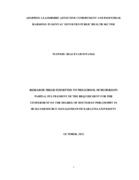| dc.description.abstract | A harmonious workplace that guarantees satisfaction of workers and employers’ aspirations is
essential for enhanced services provision in Kenya’s devolved public health sector. Since the
devolution of healthcare services in 2013, the devolved public health sector has been affected by
frequent and often localized health workers’ industrial actions. These industrial actions have an effect
not only on the citizens well-being but also affects the economic growth of the country. The general
objective of this study was to determine the influence of adaptive leadership on industrial harmony
mediated by affective commitment in Kenya’s devolved public health sector. The specific objectives
of the study were; to determine the influence of collaborative stakeholder engagement, employees’
involvement in decision making, continuous organizational learning and leaders’ relational
authenticity on industrial harmony and to examine the mediating influence of affective commitment
on the relationship between adaptive leadership and industrial harmony in the Kenya’s devolved
public health sector. The study was guided by three theories namely; Attitudinal Commitment
Theory, Experiential Learning Theory and Social Exchange Theory. To achieve these objectives, the
study used pragmatic research paradigm. The study research design was concurrent mixed methods
research methodology. The target population for this study was 3,355 health workers in level 5
County referral hospitals, in the Central Economic Regional Bloc (CEREB). The study selected 351
respondents using stratified random sampling. In addition, 10 Medical Superintendents (MS), 10
Secretary Generals from Kenya Medical Practitioners and Dentists Union (KMPDU) and Kenya
National Union of Nurses (KNUN) were selected for participation in the study through purposive
sampling. The research instrument was tested for validity using content validity, criterion validity
and construct validity and for reliability, using Cronbach alpha coefficient. The pilot study was
carried out at Karatina Level 4 Hospital in Nyeri County as the cadre of staff employed in level 4
hospitals are similar and with almost similar facilities as those of level 5 hospitals. Data analysis
involved both qualitative and quantitative analysis. Qualitative data collected through the interview
guide was analyzed using content analysis technique. Quantitative data collected using the
questionnaire was analyzed using descriptive and inferential statistics. Descriptive statistics
comprised means and standard deviation while inferential statistics comprised simple linear
regression and multiple regression analysis. The study established that collaborative stakeholder
engagement had a positive and significant influence on industrial harmony (β=1.255, p-value=.000);
that employee involvement in decision making had a positive and significant influence on industrial
harmony (β=.939, p-value=.000); that continuous organizational learning had a positive and
significant influence on industrial harmony (β=1.093, p-value=.000); that leaders’ relational
authenticity had a positive and significant influence on industrial harmony (β=.703, p-value=.000).
Collaborative stakeholder engagement had the highest influence explaining 18.5% of industrial
harmony. It was followed by continuous organizational learning at 14%, employee involvement in
decision making at 10.3% and finally leaders’ relational authenticity at 5.8%. Affective commitment
was found to have a positive and significant mediating influence on the relationship between adaptive
leadership and industrial harmony (β=.141, p-value=0.018). The study concluded that collaborative
stakeholders’ engagement, employee’s involvement in decision making, continuous organizational
learning, leaders’ relational authenticity and affective commitment enhanced industrial harmony in
the Kenya’s devolved public health sector. The study recommends the expansion of the workplace
stakeholders engagement systems, strengthening of suggestion schemes and brainstorming sessions
and that more efforts be put in creating, retaining and transferring knowledge within the sector. It
further recommends setting up of high moral and ethical standards among managers and that
employees should be part and parcel of the team(s) that develop strategic plans and policies in the
sector so as to encourage co-ownership of sector goals and objectives. This research contributes to
the body of knowledge by providing a model of determining the level of industrial harmony given
the influence of affective commitment and adaptive leadership. | en_US |
